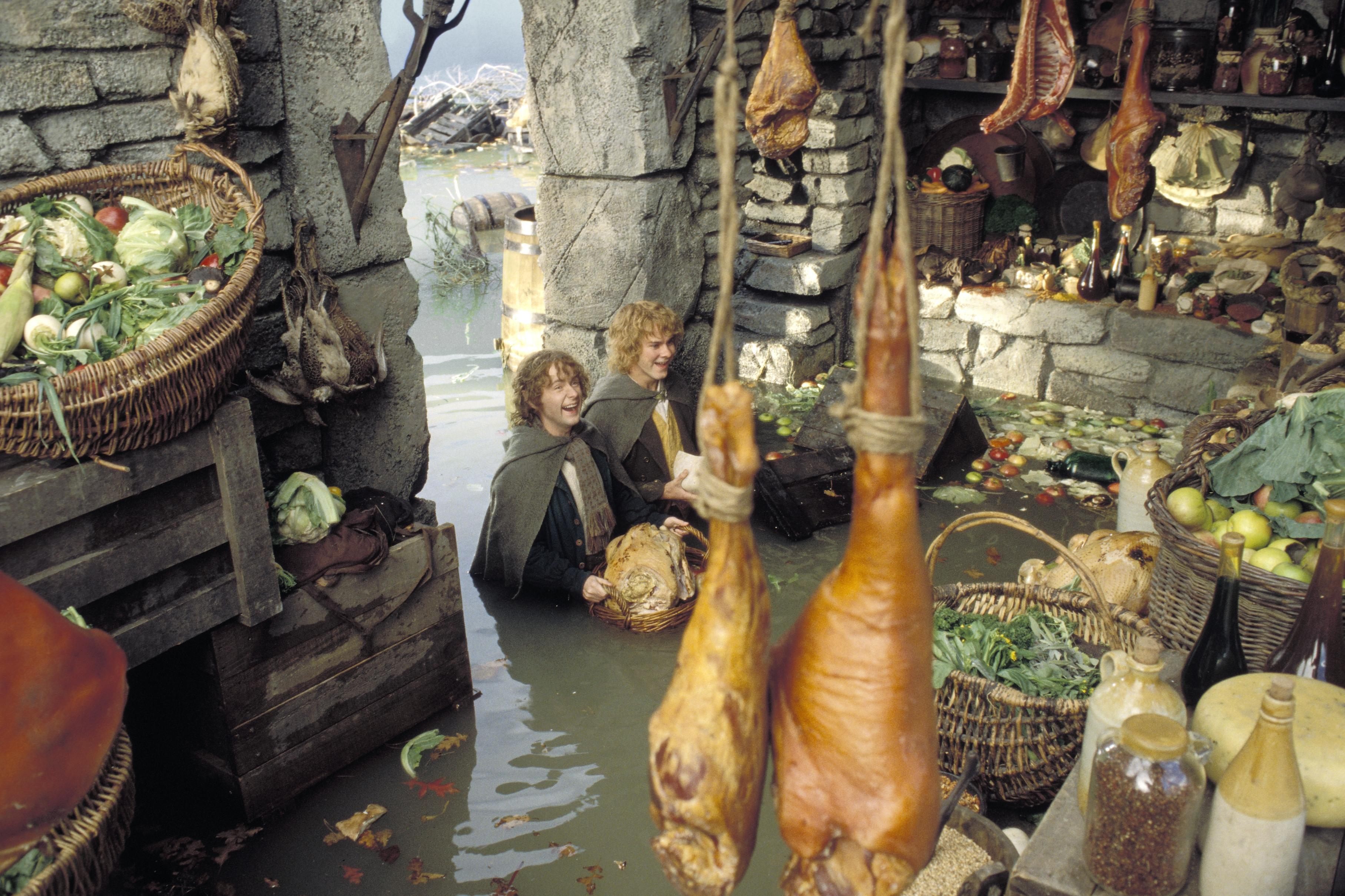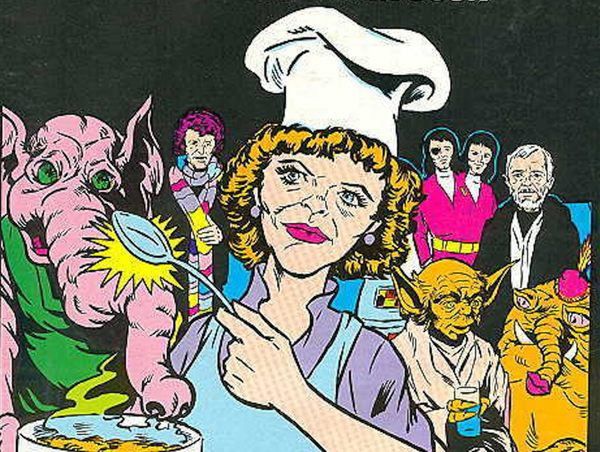When fans really love a character, they try to embody them from all angles: dressing up like them (cosplay) or traveling to the place they canonically live (fan tourism) or creating works of art about them (fanart, fanfiction, vids, playlists—only some of a huge range of things under the “fanworks” umbrella). But to really understand a character from the inside, there’s nothing more intimate than the food they eat.
Food is threaded throughout all sorts of fannish practices and experiences. The officially sanctioned offerings are often the most visible—think of a theme park, where most things you put in your mouth will have an ostensible connection to a fictional world. This can vary from simple branding to full-on recreations of something characters eat or drink. Official cookbooks span this range, too—and often have mixed results. Who hasn’t bought the cookbook for their favorite show or book only to find very ordinary recipes with half-hearted ties back to the source? (I do, however, own the 1996 Frasier tie-in, the Café Nervosa: The Connoisseur’s Cookbook—and its cappuccino and biscotti recipes feel perfectly canonical.)
Really trying to capture the food of a fictional world often falls to fans themselves—after all, they’re the ones who have the time, interest, and collective imagination to get canonical food from page or screen to the table. That might mean cataloging every food reference in a work, or creating themed meals to pair with a re-read or re-watch. Sometimes it’s about direct recreations: on the wildly popular Binging with Babbish YouTube channel, for example, chef Andrew Rea recreates screen-accurate versions of fictional food—say, the nachos from The Good Place, or the ratatouille from, well, Ratatouille. Fans can simply enjoy watching fictional foods come to life, or they can cook them in their own kitchens, too.

But for all the pleasure of seeing screen-accurate food and drink, in the fanfiction world, food—and the cooking of that food—often works on a deeper level. “From my very earliest understanding of fiction, it always had this component of what is now my favorite canonical tag on AO3, ‘Food As A Metaphor For Love,’” says V. Arrow, the host of the podcast This Week In Fandom History. The ‘Food As A Metaphor For Love’ tag has been appended to thousands of stories on the popular fic-hosting website Archive of Our Own, often in conjunction with depictions of cooking. “That’s such a part of how I think about building character and building intimacy and building relationships,” Arrow says. “I always joke that the only thing I know how to write is two people having a heart-to-heart while cooking together.”
Fanfiction allows writers and readers to engage with their favorite characters more closely than the source material often allows—depicting domestic activities, missing scenes, and the kinds of thoughtful conversations that, say, a big-budget superhero film won’t have the space to include. But while much has been written about how these quieter moments can flourish in an ostensibly culinary setting like the coffee shop AU—an “alternate universe” where characters are cast in roles in a coffee shop, usually some combination of baristas and customers—there’s relatively little commentary about the actual acts of cooking and eating in fanfiction.
“It’s such an encapsulation of who all these characters are, and it’s one that we very, very rarely get in canon for most things that have a transformative fandom,” says Arrow, referring to the types of fan communities that create art about their objects of fandom. “The Bear is really in a class of its own in terms of being something where we see characters cooking, and it has a transformative works fandom.” Similarly, the manga and anime Dungeon Meshi, which has been a fandom darling in spaces like Tumblr in recent months, depicts characters cooking both canonically and in fanworks. But generally, food onscreen or on the page often appears sans cooking—and often only briefly—if we get to see characters eating at all. And it’s even more rare to see whether characters made their own food, or had it made for them.

There’s a running joke in fandom that a single food reference in the source material—say, a character idly eating an apple, perhaps only because that’s what the production team had on hand—will mean fans will write said character as singularly obsessed with that food item. Anyone who’s spent time in a fandom knows the truth in this—but they’ll also know that food and cooking can be used in far more nuanced ways: to really dig into characterization, or to explore cultural heritage and backstory, or folded into the plot to give more depth to daily lives.
And because of the free-form nature of fanfiction—overwhelmingly published online, with unlimited pixels of space—that can mean actual recipes included directly in the stories. Arrow, who says she’s been putting food into fanfiction since before she know what fanfiction was (as a child, she rewrote Bread and Jam for Francis, “but with more food in it, which is impressive, considering how much food is already in that book”) wrote one Hunger Games fic where a now-elderly Peeta bakes a series of dishes that remind him of long-gone friends, with the prose in one column and the recipe he’s baking running alongside it.
There’s a long history of fans publishing recipes for other fans: on the communal wiki Fanlore, you can browse scans of beautiful fannish cookbooks from the pre-internet zine era. There’s Star Trek, of course, but also cookbooks for fandom cult classics like the ’60s horror soap Dark Shadows or the ’80s live-action Beauty and the Beast TV show. These books are conversations between fans—just like the recipes embedded in fanfiction online today.

When I put out a call for fans who either wrote recipes into fic or made a recipe they encountered in a fic, I was overwhelmed with responses—fans connecting with each other, through a shared love of characters and the things they cook. “I was taught how to make caramelized hot chocolate by Stiles Stilinski, in a fic,” says a fan who goes by Sam. (Stiles Stilinski is a main character in MTV’s Teen Wolf.) “You cook the sugar slowly first, alone, until it caramelizes, then add the milk and cocoa. It’s heavenly!” SnapDragonAndDungeons baked ginger molasses cookies from a particular Avengers story where “each of the Avengers teaches Tony [Stark] a recipe to show how much they care about him,” with the recipes themselves following each cooking scene. Sara made an apple pie recipe featured in a Supernatural fic, which “turned out really well and it was really fun to do”—especially when following the in-story tips offered up as the characters bake the pie.
Often, it’s the role of a dish within the story that leads fans to try to make it for themselves. Kate describes a Game of Thrones fic that hinges on a Brussels sprouts dish called “World Peace Salad.” “Making the salad myself brought the story to life a little bit more for me,” she says. “It was definitely that classic reader experience of wanting desperately to eat what the characters were enjoying on the page.” For Lyndsey, it was a Supernatural fic she read more than a decade ago, where the protagonists sampled wedding cakes. The description of their favorite cake—a peanut butter-pumpkin one—led her on a years-long quest to find a perfectly matching recipe, with a great deal of experimentation along the way. “I don’t think I’ll ever eat a cake that truly lives up to the idea that [the author] put in my head, but in pursuing that ideal I went on a whole culinary journey,” she says. “It inspired me to bake more often, and made me more confident in trying ingredients or techniques I wasn’t familiar with.”
For fic writers themselves, including recipes in their work can also expand their own culinary repertoires. Phoebe, who wrote a series of stories about characters from Martha Wells’s Murderbot Diaries cooking for each other, shares the recipes for the benefit of the readers, but says that “it’s also become a way for me to push my own cooking/baking further, because I don’t want to put a recipe in the fic that I haven’t cooked myself.”
But recipes—and the scenes that go with them—are also about expressing something deeper about a character or a world. V. Arrow says many of her dozens of food-oriented stories are about Jewish characters and Jewish food traditions, thereby connecting her own culinary heritage to theirs. Another author, Maya, describes a similar experience writing about Susie, a Jewish character in Eva Ibbotson’s The Countess Below Stairs, teaching her non-Jewish husband about sufganiyot. “For a lot of American Jews in particular, I think there is a very deep connection between being raised/feeling Jewish and food,” Maya says. “There’s so much love that comes across in the food we make, and Susie cooking a beloved family recipe during her first Hanukkah as a married woman felt like the best way to have her communicate her love.”

An author describing their own food traditions through fanfiction can offer a deeper connection to readers, as well. Stasia, the author of a Hobbit story set in the modern day (with rock stars!) describes her relationship with readers as “all of us metaphorically sitting around a table, eating the food I’d mentioned in the story.”
“Sharing food is one of the oldest ways we have to connect with other humans,” she says. “I deeply enjoyed the experience of sharing food—even if just in textual form—with all the wonderful, fun people I met while I was writing and posting this story.”
“Authors already invite readers into our heads,” says azriona, who’s written recipes into multiple fics centered on food, including a series where the characters of BBC’s Sherlock are professional chefs. “I’m just also inviting them into my kitchen.” Her experience writing that series reflects the communal and at times beautifully amateur nature of fanfiction on a whole—she says some readers assumed she had professional culinary training, but she was just testing out recipes as she wrote. Fans have long loved to talk about the things they learned from fic, information shared fan-to-fan via the characters they love, and azriona says that she can see the effect of her food-oriented fic in all the feedback she’s gotten from readers.
“That I wrote something that convinced someone else to try something new? To do something that might make their lives a little better? How many authors get to say that? I do,” she says. “If I have no other legacy in fandom, I have that. I hope, 10 years later, that they’re still cooking, even if it’s only a few things, or once in a while, or if they don’t even remember how they got started. I hope they just cook, for themselves or someone else, and feel good about what they’ve made.”
Gastro Obscura covers the world’s most wondrous food and drink.
Sign up for our email, delivered twice a week.

